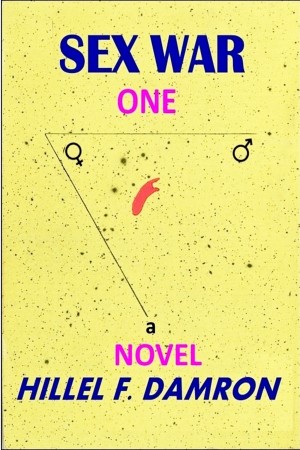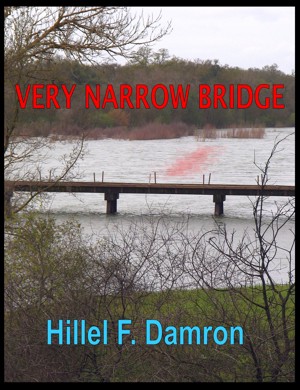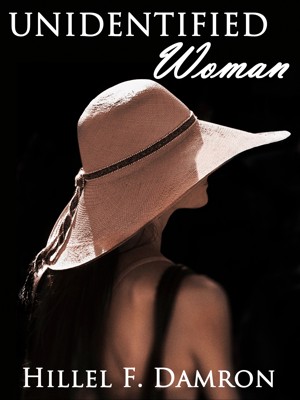Interview with Hillel F. Damron
Published 2014-11-26.
The United States is not your native country. Where did you grow up?
I was born in Israel, in a kibbutz. It was a unique rural communal back then, hard farm labor during the day and a beehive of intellectual, political, and artistic activity during the evening and night. In general, the kibbutz was a society dedicated to social justice. It was a paradise as I was growing up. You can learn more about it by reading The Sweet Life, my Moment Magazine’s entry, which won its 2011 memoir contest. (You can find it in my literary website, HillelBridge.com) More than forty years after I left that small place, shortly after my army service had ended, it remains to this day the most significant experience of my life.
You mentioned your army service. Care to elaborate?
Army service in Israel is mandatory, and I was enlisted at age 19, after working for one year with inner city kids in the coastal city of Haifa. What can I tell you, I served for almost three years, as well as close to twenty-four years in reserve. I was a soldier first, then an officer in an elite paratroops reconnaissance unit. I’ve been to war, not once, and was wounded in battle. I left good friends behind, dead in the battlefield. Most probably, it was the second most significant experience of my life.
Most probably you say. What would be your third most important experience?
That would surely be my two marriages. In other words: the battlefield of the sexes. It would include, in general, all my interactions with women throughout the years: the peaks and valleys, from girlfriends to marriages to affairs. Suffice to disclose that I am now flying happily solo, my cat on my lap, above the smoldering ruins of my marriages, with two successful sons on both sides of my wings. No wonder my current book is Sex War One. And even though it is a speculative (& science) fiction in form, it deals with these issues in substance.
The battle of the sexes, you mean?
Correct. Though I have to tell you those two experiences of my life I've mentioned earlier – growing up in the kibbutz and serving in the army and at war – play a large part in it as well. The book is adapted from my own novel, War of the Sexes, published originally and traditionally in print in Hebrew. It was described by the Encyclopedia of Science Fiction as "set in a post-Holocaust underground colony, where a society of sexual equals devolves into full-scale subjugation of males.” Love is almost dead there, I would add, substituted by an abundant of unemotional, free-for-all sex. But then something goes terribly wrong: a different female baby is mistakenly born in the birth-lab, with a different shape and color from the regular, "normal" children. This catalyst induces two unforeseen, starkly opposing consequences: the return of love and affection on the one hand, and the dictatorial rule of women over men on the other. Ultimately, the oppression of the males leads to a revolt, and eventually to a full-scale war between the sexes, with the survival of the human race again at stake.
Sound very intriguing. What made you decide to translate it, and why now?
Good question. Since I immigrated to America 28 years ago, friends and family familiar with the book had insisted I should translate it. But I was always too busy with the mundane tasks of life, such as earning a living and trying to maintain my family afloat, as well as my wish to write other books. Now that I've done some of these other things, I've found myself thinking that in today's society the trends of sexual interactions make some of the things I've written about 32 years ago in that book so much more acute, topical and intriguing as you say. I suddenly felt the urge to not only translate it into English, but also to adapt and update it, while reexamining the issues my book originally had dealt with and had foreseen, such as the abundant of unemotional sex – the hookups of today – the spread and acceptance of pornography, the lack of emotional love, the disintegration of traditional families, people living alone more than together, "the end of men" so to speak, babies being born (sometimes) more in the lab than in the womb, as well as other topics. It was all there, you see, but I felt the need to revive it, and in the process of translating it into English to shed some new light on the subject as well, if I could.
You mentioned writing other books. What other books did you write?
I've written two so far, in English: Very Narrow Bridge and Unidentified Woman. Both novels are in the series of Gideon Gold Investigations, and were published only as e-books (via Amazon Kindle and Smashwords for all other eBooks outlets and formats). I define their genre as Literary Mystery, not in order to be pretentious, but because of the need to let potential readers know what they really are, and what they are not. These books are not who-done-it, or action-packed page-turners, and not much of a traditional mystery either. It's much more about the "why" of crime and evil behind it than about the "who" did it and "how." Should you care to read these novels, you’ll find what hybrid they really are. I hope to continue writing more novels in that form, but other possibilities, such as another crack at Speculative/Science fiction – Sex War Two comes to mind, first – pure literary or even a memoir, are all possible.
That's a lot to accomplish. Can you describe your process of writing?
I'm a slow writer, I have to say, and write not in my mother's tongue now, which doesn't speed up the process. On the other hand, lightning strikes my head fast and often, and in the most unexpected of places and times. It can even be a random line I hear, a few words being said, or an article in the paper or online. But mostly, it's an idea that has been percolated inside me for a while. I let it incubate for a long time while writing notes and related words, until it takes the shape of a synopsis of some sort. When I can no longer hold it inside me – pregnancy will be the right comparison here – I give birth to it one early morning. I write the first draft longhand, with a fountain pen on lined paper, in a frenzy that takes months. After that it's just a long, hard work: namely rewires.
What does your writing schedule look like?
I write first thing in the morning. I’d like my head to not be polluted, other than by my dreams, when I sit down to write. How early I start and how many hours I can devote to writing depend on so many other things. I maintain also a literary website at HillelBridge.com, where I regularly post segments of my short stories, and a political blog as well at Good4Jews.com, where I post about the politics of Israel, America and the Middle East. There goes my afternoon. And then I'm off for some physical exercises and a good, liberating, spiritual walk outside, as close to nature as possible.
When do you find time to read, and who are your favorite writes?
As I said, I get up in the morning out of bed and sits down to write, and before going back to bed at night I sit down and read. These are the bookends of my day. I read literary novels, mainly, as well as mystery and spy novels, and the occasional nonfiction book. My three literary godfathers are Dostoyevsky, Kafka and Camus. As for science fiction, I was most influenced by Huxley, Orwell and Heinlein. As for more contemporary writers, I have to say Garcia Marques (who passed away earlier this year), Coetzee and Le Carre` are my favorites.
Do you ever encounter a writer's block, and how do you overcome it?
I don’t believe there is such a thing as “writer’s block.” Lazy writers invented it, or those too drugged and intoxicated, or those lacking imagination and the necessary discipline to sit down and write. I firmly believe it is just an excuse not to write. Which is, admittedly, a very hard work. My advice to would-be writers is: start writing now, and write what drives you to write
Smashwords Interviews are created by the profiled author or publisher.
Books by This Author
Sex War One
by Hillel F. Damron
All goes well in this post nuclear-Holocaust underground colony of sexual equals until – as result of a mistake in the birth-laboratory that turns into a catalyst – it devolves into a dictatorship with a full-scale subjugation of males. A revolt and an all-out war between the sexes ensue, with the survival of the human race again at stake.
Very Narrow Bridge
by Hillel F. Damron
“Our crime was a crime of the heart, if it was a crime at all.” That the last sentence in Joy Plummer’s last letter to Gideon Gold, the private investigator who has made her union with her long-lost father possible. He was a Vietnam War hero, Ray De Rosi, and his unusual, complicated relationship with his daughter is at the core of this novel: a hybrid of literary and mystery fiction.
Unidentified Woman
by Hillel F. Damron
Literary crime novel about rape, revenge and redemption. A young Mexican girl is kidnapped on her way to school, enslaved and repeatedly raped by paying customers. She survives and grows up to become an independent young woman living in L.A. She tracks down those men who wronged her, exacting a deadly, unusual punishment. On her footsteps is a reluctant private investigator, a former Mossad agent.



